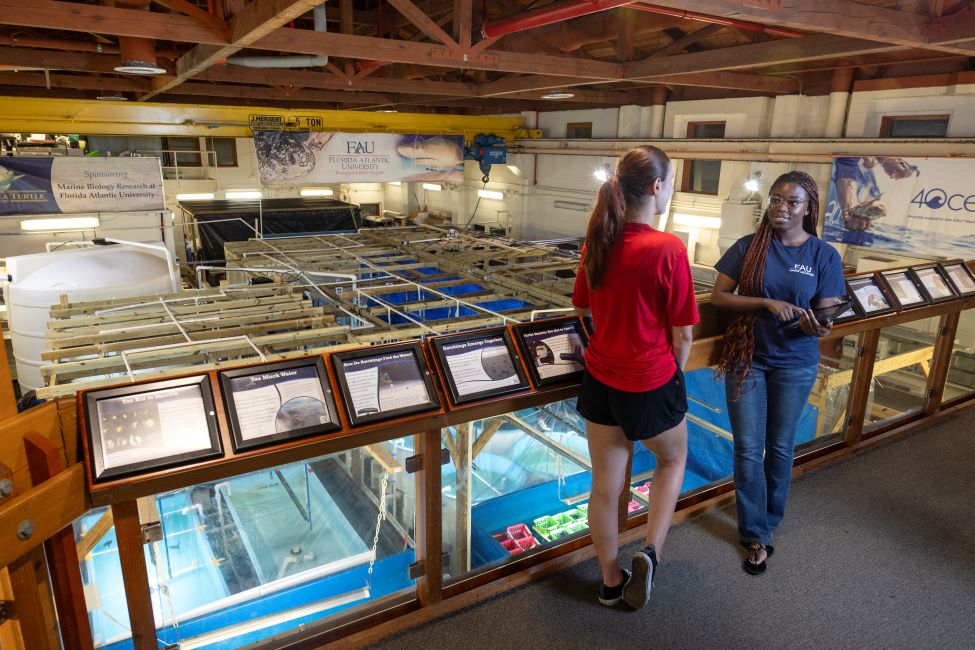FAU Marine Science Lab Receives $1.6M from Glenn W. Bailey Foundation

FAU has received $1.6 million from the Glenn W. Bailey Foundation to extend its Marine SEA Scholars Program. (Photo by Alex Dolce)
Florida Atlantic University has received $1.6 million from the Glenn W. Bailey Foundation to extend its Marine SEA (Science, Education, and Arts) Scholars Program within the Charles E. Schmidt College of Science’s Marine Science Laboratory.
Housed in the Gumbo Limbo Environmental Complex in Boca Raton, the program provides financial assistance to students who demonstrate academic excellence and a commitment to become ambassadors of community outreach focused on FAU Marine Science Lab studies, discoveries and activities. The initial gift to establish this was received in 2020, and this latest gift will extend the program for five more years.
“The continued support of our students through this gift from the Glenn W. Bailey Foundation enables dreams to become realities, allowing our students to learn as they work in the lab with researchers, and become ambassadors sharing FAU marine biology research discoveries to broad audiences,” said Jeanette Wyneken, Ph.D., director of the Marine Science Lab and professor of biological sciences in the Schmidt College of Science. “This program has been a gamechanger for students and the marine lab. We are excited and grateful to be able to continue offering the opportunities this gift provides.”
The goal of this program is to develop well-rounded, skilled and knowledgeable individuals who are motivated to understand science through participation in established studies at the FAU Marine Science Lab; engagement in the public education and outreach activities; and enhanced effective communication of science to broad audiences.
“We truly appreciate this gift from the Glenn W. Bailey Foundation, which allows us to continue educating and supporting the next generation of scientists and problem solvers through the Marine SEA Scholars program,” said FAU President Stacy Volnick. “By increasing the accessibility of marine science to our students and our community, this program is improving environmental stewardship and inspiring future scientists and policy makers.”
The Marine SEA Scholars program also supports a postdoctoral fellow and three graduate students through stipends, as well as five fulltime undergraduate students through tuition reimbursement and a stipend to work 20 hours per week in the Marine Science Laboratory. Comprised of a variety of majors, the SEA Scholars use their diverse skills and contemporary knowledge and focus on studies that relate to and support the program’s mission.
“Dr. Wyneken’s SEA Scholars program not only trains the next generation of scientists, but also serves as a catalyst for our future science communicators, bringing students together from across the university to educate our community members about complex research and marine conservation topics,” said Valery Forbes, Ph.D., dean of the Schmidt College of Science. “This gift from the Glenn W. Bailey Foundation is funding unparalleled experiential student learning opportunities in a world-class research laboratory and community outreach center.”
Established in 1990, the FAU Marine Science Laboratory – part of the Department of Biological Sciences in the Charles E. Schmidt College of Science – is a unique site of scientific inquiry and discovery open to the public. Located at the Gumbo Limbo Environmental Complex, the lab’s faculty and students conduct world-class research while an upward of 200,000 annual visitors observe the lab’s ongoing research activities with a bird’s eye view from the lab’s gallery.
For more information on the SEA Scholars program, visit here; and for the Marine Science Lab, visit here.
-FAU-
Latest News Desk
- FAU Foundation Board Welcomes New MembersFlorida Atlantic University's Foundation Board of Directors welcomed Zachary "Zach" Berg '97, '00, Michael Yoon '96 and Thomas "Tommy" Zeichman '09 to its board.
- FAU Researcher to Make Big 'Splash' in NatGeo's SharkFestShark fanatics, science buffs and ocean advocates won't want to miss a thrilling new episode of NatGeo's "Florida's Bite Capital," with FAU professor Stephen Kajiura, Ph.D. on National Geographic.
- FAU's Paulina DeVito Awarded Elite NSF Graduate Research FellowshipPaulina DeVito, 22, a Ph.D. candidate in FAU's College of Engineering and Computer Science, has been awarded a prestigious National Science Foundation fellowship for her exemplary work in AI and education.
- Hope for Brain Cancer: FAU Awarded Grants for Glioblastoma TreatmentFAU researchers are pioneering a new approach to treating glioblastoma - a highly aggressive brain cancer with one of the highest mortality rates - by targeting the gene MBLAC1 for the first time.
- John Kelly, Ph.D., Announces Retirement from FAUAfter over a decade of dedicated service, John Kelly, Ph.D., announced his retirement from FAU. Having served as FAU's president during a transformational eight-year tenure, his last day will be June 30.
- Chef José Andrés' Longer Tables Fund Will Expand FAU Queen Conch LabThe grant awarded to FAU Harbor Branch supports the expansion of its queen conch aquaculture lab and is part of a global philanthropic effort to tackle urgent challenges through the power of food.






